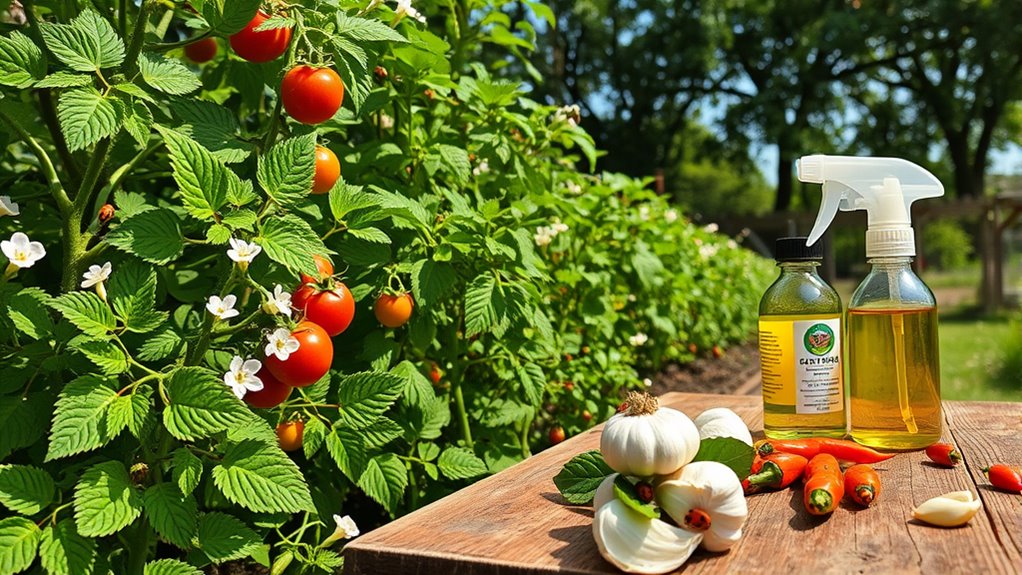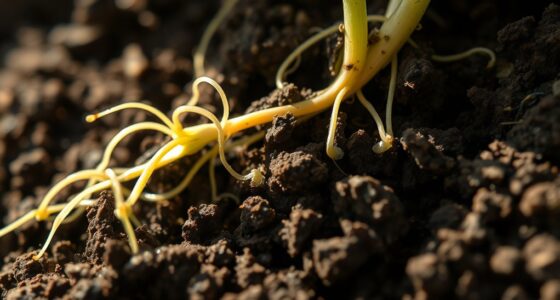To effectively control pests organically, start by encouraging beneficial insects like ladybugs and lacewings that eat pests naturally. Use natural repellents such as neem oil, garlic spray, or chili pepper solutions to deter pests without harm. Regularly monitor your plants for early signs of infestation and maintain good garden hygiene by removing damaged plant material. Plant herbs like marigolds and mint to repel pests and attract helpful insects. Combining these methods creates a thriving, pest-resistant garden—explore further to discover more effective techniques.
Key Takeaways
- Attract beneficial insects like ladybugs and lacewings using diverse flowering plants to naturally reduce pest populations.
- Use natural repellents such as neem oil, garlic spray, and chili pepper solutions to deter pests effectively.
- Regularly monitor plants for early pest signs and target specific pests with natural remedies or beneficial insects.
- Maintain garden hygiene by removing infested material and planting pest-repelling herbs like basil and marigolds.
- Integrate multiple methods, including fostering beneficial insects and natural repellents, for a sustainable, chemical-free pest control system.

Organic pest control methods offer an effective and eco-friendly way to protect your garden without relying on harmful chemicals. Instead of reaching for synthetic pesticides, you can harness nature’s own defenses to keep pests at bay. One of the most powerful strategies involves encouraging beneficial insects to thrive in your garden. These helpful insects, like ladybugs, lacewings, and predatory beetles, naturally hunt and consume pests such as aphids, whiteflies, and caterpillars. By creating a welcoming environment—planting a diversity of flowering plants, avoiding broad-spectrum insecticides, and providing shelter—you invite these beneficial insects to establish themselves. Once established, they act as natural allies, reducing pest populations without any chemical intervention.
In addition to attracting beneficial insects, using natural repellents can remarkably enhance your pest management. Natural repellents—such as neem oil, garlic spray, and chili pepper solutions—are safe for your plants, your family, and the environment. These substances work by masking the scent of your plants or directly deterring pests from landing or feeding. For example, neem oil not only repels pests but also disrupts their life cycle, preventing them from reproducing. Garlic spray emits strong odors that pests dislike, and chili pepper solutions create a fiery barrier that pests avoid. Applying these repellents regularly can help keep pest numbers down, especially when combined with other organic methods.
Timing and consistency are key when using organic pest control. Regularly inspecting your plants allows you to catch early signs of infestation before pests become overwhelming. When you identify pests, target them specifically with natural repellents or introduce beneficial insects directly onto affected plants. For instance, releasing ladybugs into your garden can quickly reduce aphid populations. Remember, the goal isn’t to eliminate every pest but to maintain a balanced ecosystem where pests are kept in check naturally. Over time, your garden becomes healthier and more resilient, reducing the need for intervention.
Furthermore, maintaining good garden hygiene—removing diseased or infested plant material and cleaning tools—helps prevent pest outbreaks. Companion planting also plays an essential role; planting herbs like basil, mint, or marigolds can repel pests while attracting beneficial insects. Additionally, understanding archival data and ongoing updates can help you stay informed about the latest organic pest control techniques and trends. By integrating these organic methods—fostering beneficial insects, applying natural repellents, and practicing good garden maintenance—you create a sustainable system that protects your plants without harming the environment. This approach not only keeps your garden healthy but also aligns with eco-conscious gardening principles, ensuring your outdoor space remains vibrant and pest-free naturally.
Frequently Asked Questions
Are Organic Pest Control Methods Safe for Children and Pets?
You’re wondering if organic pest control methods are safe for children and pets. Generally, these methods prioritize child safety and pet protection, using natural ingredients like neem oil or diatomaceous earth. Unlike chemical options, they diminish health risks and are less likely to cause harm. Still, always read labels carefully and apply treatments properly to guarantee safety. When used correctly, organic pest controls are a safer choice for your family and furry friends.
How Long Does It Take to See Results From Organic Pest Control?
Imagine waiting in anticipation, wondering when you’ll see pest elimination take effect. Timing expectations vary depending on the pest and method used, but typically, you might notice results within a few days to a couple of weeks. Organic pest control methods often work gradually, giving you a safe, effective solution without harsh chemicals. Stay patient, and soon, your space will be pest-free, thanks to these natural, reliable approaches.
Can Organic Methods Eliminate All Types of Pests Effectively?
You might wonder if organic methods can eliminate all pests effectively. While they’re great at addressing common pests, chemical resistance and pest adaptability can pose challenges. Some pests develop resistance over time, making organic controls less effective. However, by using diverse strategies like biological controls and proper sanitation, you can improve success rates. Organic methods work best when tailored to specific pests and combined with ongoing monitoring.
Are Organic Pest Controls Cost-Effective Compared to Chemical Alternatives?
When comparing organic pest control to chemical options, you’ll find that organic methods often cost more upfront but can be more cost-effective long-term due to fewer health and environmental risks. Your budget considerations should include not just the initial expense but also ongoing application costs and potential savings from avoiding chemical damage. A clear cost comparison helps you choose the pest control approach that aligns best with your budget and sustainability goals.
Do Organic Pest Control Techniques Require Professional Expertise?
You might wonder if organic pest control techniques need professional expertise. Generally, DIY techniques are simple enough for you to handle with basic knowledge, as many effective organic methods like neem oil or traps are user-friendly. However, for larger infestations or complex issues, hiring professional services can guarantee proper application and effectiveness. It’s all about evaluating your comfort level and the problem’s severity to decide whether to DIY or call in experts.
Conclusion
By trying these organic pest control methods, you’re not only protecting your garden naturally but also supporting a healthier environment. Did you know that using organic techniques can reduce chemical runoff by up to 70%, helping keep your local waterways clean? Keep experimenting with natural solutions, stay consistent, and watch your garden thrive without harmful pesticides. Embrace eco-friendly pest control, and you’ll enjoy a greener, healthier outdoor space for years to come.









